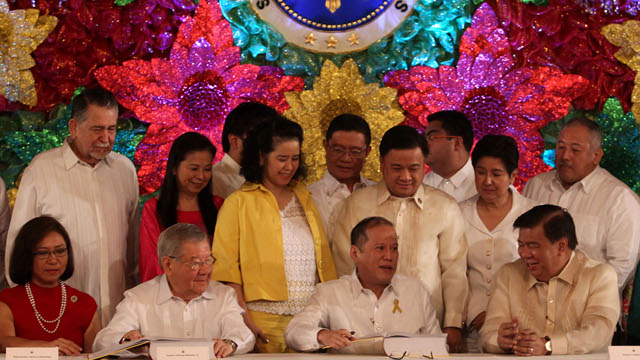SUMMARY
This is AI generated summarization, which may have errors. For context, always refer to the full article.

MANILA, Philippines (2nd UPDATE) – President Benigno Aquino III on Wednesday, December 19 signed the P2.006-trillion 2013 national budget into law, allowing the government to frontload spending early next year.
Social services, including education, health care and cash subsidies for the poor, will get the biggest share of the budget, which is 10.5% higher than the P1.816 trillion earmarked for 2012.
“We designed this budget as an instrument to give the common man the power to control and improve his life,” Aquino said during the signing ceremony.
He thanked lawmakers for passing the budget on time — for the third year in a row. He also thanked them for approving a controversial measure that will help fund next year’s national spending.
The sin tax bill, which will raise additional P34 billion revenues through higher excise taxes on tobacco and alcohol products, is now awaiting Aquino’s signature.
Government spending
Budget Secretary Florencio Abad said the early signing of the 2013 budget will allow the government to start rolling out projects and programs as early as the first working day of January.
“We have every reason to believe that public spending will go on a confident and energetic trajectory in 2013,” he told reporters.
“The agencies can get on with their priority programs and projects with little or no delay, so that Filipinos can gain immediate access to key public goods and services.”
Asked whether they will frontload public spending in the first semester, Abad said, “yes, many of the infrastructure projects. Total capital outlay this year is about P400 billion.”
Abad said “the early implementation of projects, the beginning of the implementation of many PPPs (Public-Private Partnerships) as well as frantic spending that will accompany the 2013 May elections” all point out to a “robust” growth for the Philippines next year.
Social services
The budget includes P44.2 billion for the conditional cash transfer (CCT) program, up 12% from this year, said Abad.
The 3-year-old scheme gives up to P2,500 a month to the poorest families who meet certain criteria, like keeping their children in school and getting them as well as pregnant family members to regularly visit public health clinics.
Government officials say this gives over 26% of the Philippines’ population a better opportunity to climb out of poverty.
The cash subsidies are part of government social services, which also include education and health care.
The Department of Education will get the biggest allocation among government agencies, with P232.6 billion, up 22.8% from P238.8 billion this year.
Here is the breakdown of the budget for the departments:
- Department of Public Works and Highways – P152.400 billion
- Department of National Defense – P121.600 billion
- Department of the Interior and Local Government – P121.120 billion
- Department of Agriculture – P74.100 billion
- Department of Health – P56.800 billion
- Department of Social Welfare and Development – P56.200 billion
- Department of Transporation and Communications – P37.100 billion
- Department of Finance – P33.200 billion
- Department of Environment and Natural Resources – P23.700 billion
– Rappler.com, with a report from Agence France-Presse
Add a comment
How does this make you feel?
There are no comments yet. Add your comment to start the conversation.